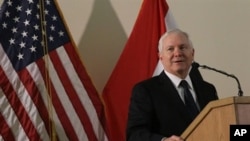U.S. Defense Secretary Robert Gates says he expects "significant" new sanctions to be imposed on Iran for its nuclear program.
The remarks Friday, made as Gates visits Iraq, come as other Western leaders are also warning of possible sanctions.
Gates said the sanctions were likely unless Iran "change[s] course" and follows through on agreements made in October."
He was referring to a U.N.-backed deal under which Iran would send stocks of low-enriched uranium abroad for further refinement, rather than doing it themselves. Iran ultimately rejected the deal.
Western countries suspect Iran is trying to build atomic weapons - which Tehran denies.
During Thursday's U.N. Security Council debate, French Ambassador Gerard Araud said France will present a new U.N. sanctions resolution if Iran fails to provide reassurances that its nuclear program is peaceful. Araud did not give a specific timeframe, but said "the clock is ticking."
The U.S. ambassador to the United Nations, Susan Rice, said Iran could face further action if it fails to meet its obligations.
Britain's U.N. ambassador Mark Lyall Grant criticized Iran for resisting the U.N.-backed nuclear fuel swap agreement. He said the council could take up sanctions discussions as early as January.
Both Russia and China's ambassadors to the Security Council called for restraint and patience, and said the dispute should be resolved through diplomatic means, instead of sanctions.
The Security Council already has approved three rounds of sanctions against Iran for its failure to halt enrichment activities.
During Thursday's meeting, Security Council members outlined Iran's violations of existing U.N. resolutions in the last three months, including two illegal exports of shipments of arms from Iran.
Members of the the U.N.'s International Atomic Energy Agency recently voted to censure Iran for secretly building another uranium enrichment site in addition to its one working facility.
Iran responded by announcing plans to build 10 more enrichment sites.
Diplomats say senior officials from the U.S., Britain, France, Germany, Russia and China (known as P5+1) could meet as early as next week to discuss Iran.
Some information for this report was provided by AFP and Reuters.




